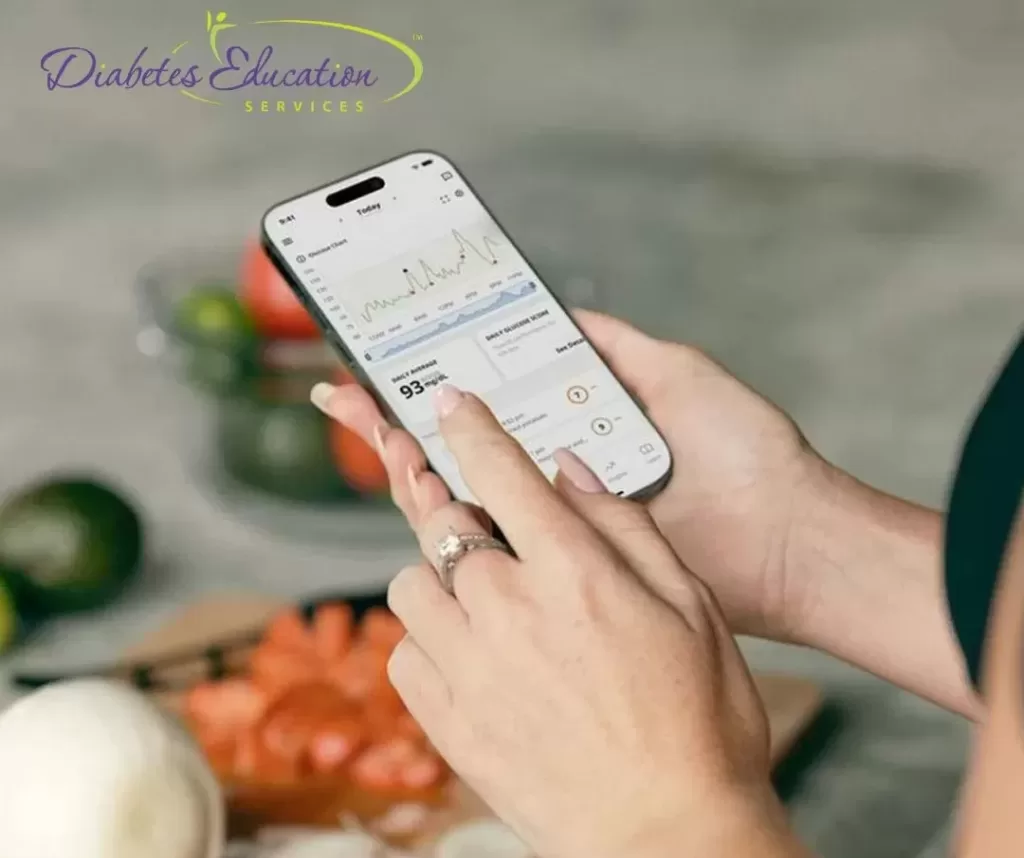
In the era of automation and artificial intelligence (AI), tools that support mealtime monitoring are growing exponentially.
Monitoring carbohydrates remains a key strategy for managing blood glucose in both type 1 and type 2 diabetes¹. While not suitable for everyone, carbohydrate management strategies have shown overall improved glycemic outcomes and can promote greater awareness of dietary intake.
Traditional carbohydrate counting, however, can be time-consuming and prone to errors.
Advanced carbohydrate counting often requires not only knowing the amount of carbohydrate in a food but also understanding the impacts of mixed meals (including fats, proteins, and fiber content) and the glycemic impact of specific food choices relative to insulin dosing. This becomes especially challenging when dining out, eating mixed dishes, navigating unfamiliar food choices, estimating portion sizes, or consuming meals without nutrition labels². Variability in preparation methods and hidden ingredients can further complicate accuracy.
AI is attempting to make this daily management task easier and more accurate.
Apps and generative artificial intelligence (GenAI) can now analyze not only total carbohydrate content but are now starting to consider factors such as meal composition, glycemic load³, individual glycemic responses⁴ and even individual microbiome.
These tools offer the potential for more personalized information.
Apps like SNAQ, MyNetDiary, MyFitnessPal, SnapCalorie, and many others now in app stores are integrating AI and image recognition. These apps enable users to take a photo of their meals, and the app then identifies specific foods, estimates portion sizes, and provides a breakdown of the meal’s nutritional content. Apps such as Undermyfork, RXFood, January AI, GlucoseBuddy with Meal IQ, GlucoSense AI, and again many more go further by integrating CGM data, insulin/medication dosing, and physical activity to provide personalized glucose insights.
Download App Cheat Sheet Here>>
Recently, the Dexcom G7 app added a Smart Food Log feature that utilizes AI to generate meal descriptions from food photos. This feature could simplify the logging process and help both diabetes care providers and individuals living with diabetes interpret meals consumed and glucose data. As a dietitian, this feature has been supportive due to its ease of use and reduced app burden for my clients. Having food information integrated into a tool an individual already uses can boost engagement and lead to meaningful discussions about meal planning and insulin dosing strategies. While the feature doesn’t yet provide detailed carbohydrate or nutrient analysis, there is much to gain by just knowing what individuals are consuming.
Tecce et al.⁴ conducted a recent study comparing ChatGPT-40 and Gemini Advanced for estimating carbohydrate content in real-life scenarios.
They compared two GenAI platforms for accuracy in calculating the amount of carbohydrates in fifty packaged and non-packaged meals, including the addition of minimal, moderate, or extensive descriptive data. As we have learned with all language learning models, accuracy is improved when more specificity is added. They found that with full details, such as weight, meal descriptions, and pictures, the meal’s absolute percentage error was 13.7% and 13% for ChatGPT and Gemini, but with minimal conditions the error was 34.8% and 45%, respectively.
Additionally, ChatGPT exhibited substantial variability in accuracy between non-prepackaged and prepackaged meals. In terms of time, for improved accuracy entering the additional condition details would be like manually entering data into a food database. Apps can frequently misidentify foods that look alike, struggle with portion accuracy, and have trouble understanding how a dish was prepared or what ingredients are hidden.
In one AI meal app, my hummus, consumed with celery, was incorrectly identified as peanut butter, and the portion was close, but it underestimated the actual amount. However, for individuals with significant or inconsistent carb estimation errors it may still lead to clinically significant improvements.
For example, a recent study⁵ found clinically meaningful (where carbohydrate estimates were off by more than 10 grams) estimation errors in 45% of meals logged by patients themselves, but only in 38% using the SNAQ app; the outcomes for diabetes clinical indicators is unknown. These studies showed the potential of AI tools to enhance carbohydrate estimation, but also highlights the need for continued model improvements and user validation.
While AI is an incredible new tool with great potential; barriers, accuracy, inclusion datasets, and privacy concerns exist.
Apps and GenAI may have fees and can become too costly; they require internet access and smartphone use, and may be a barrier for individuals with limited digital literacy. The 2025 ADA Standards of Care emphasize that while diabetes technology has the potential to improve outcomes, access disparities exist. If these tools lead to meaningful outcomes, we must also consider barriers to access.
We can utilize the ADCES ICC framework to select, configure and ingrate apps⁶ for each individual. As AI continues to integrate into diabetes management, meal monitoring is just one area of consideration. As a diabetes health care professional, exploring these tools for their value and faults can help us improve our understanding of usability and address concerns.
When used thoughtfully, AI could ease the burden of carb counting and support informed, data-driven decisions in diabetes care.
Download App Cheat Sheet Here>>
References
- American Diabetes Association Professional Practice Committee; 5. Facilitating Positive Health Behaviors and Well-being to Improve Health Outcomes: Standards of Care in Diabetes—2025. Diabetes Care 1 January 2025; 48 (Supplement_1): S86–S127. https://doi.org/10.2337/dc25-S005
- Lee H, Um M, Nam K, Chung S-J, Park Y. Development of a Prediction Model to Estimate the Glycemic Load of Ready-to-Eat Meals. Foods. 2021; 10(11):2626. https://doi.org/10.3390/foods10112626
- Amorim D, Miranda F, Santos A, Graça L, Rodrigues J, Rocha M, Pereira MA, Sousa C, Felgueiras P, Abreu C. Assessing Carbohydrate Counting Accuracy: Current Limitations and Future Directions. Nutrients. 2024 Jul 9;16(14):2183. doi: 10.3390/nu16142183.
- Nicola Tecce, Claudia Vetrani, Anna Lisa Pelosi, Maddalena Alfiore, Davide Mayol, Maria Grazia Maddaloni, Martina Amodio, Annamaria Colao; AI-Powered Carbohydrate Counting for Type 1 Diabetes: Accuracy and Real-World Performance. Diabetes Care 2025; dc250303. https://doi.org/10.2337/dc25-0303
- Baumgartner M, Kuhn C, Nakas CT, Herzig D, Bally L. Carbohydrate Estimation Accuracy of Two Commercially Available Smartphone Applications vs Estimation by Individuals With Type 1 Diabetes: A Comparative Study. J Diabetes Sci Technol. 2024 Jul 26:19322968241264744. doi: 10.1177/19322968241264744.
- Greenwood DA, Howell F, Scher L, et al. A Framework for Optimizing Technology-Enabled Diabetes and Cardiometabolic Care and Education: The Role of the Diabetes Care and Education Specialist. The Diabetes Educator. 2020;46(4):315-322. doi:10.1177/0145721720935125
Live in San Diego
DiabetesEd Training Seminar
Join us live October 22nd – 23rd, 2025!
30+ CEs with Expanded Accreditation!


Join our expert team for engaging, interactive sessions that bring the ADA Standards of Care to life—covering medications, behavior change, technology, and more. Ideal for CDCES or BC-ADM exam prep, this course also includes a 4-hour Virtual Medical Nutrition Therapy Toolkit (taught by blog author, Christine Craig, MS, RD, CDCES) and bonus content that also meets CDCES renewal requirements. See DiabetesEd Training Schedule Here >>
Program Objectives:
Upon completion of this activity, participants should be able to:
- Describe the current ADA Standards for diagnosis, goals, and person-centered diabetes management across the lifespan.
- Demonstrate insulin pattern management and dosing strategies in clinical scenarios.
- Implement timely screening and risk reduction strategies for microvascular and cardiovascular complications.
- Incorporate behavior change techniques and medical nutrition therapy to support people with diabetes self-management and lifestyle adjustment.
Expert Faculty:

Diana Isaacs, PharmD, BCPS, BCACP, CDCES, BC-ADM, FADCES, FCCPCES

Beverly Thomassian, RN, MPH, CDCES, BC-ADM
Faculty Bios & Disclosures
Our expert team transforms complex diabetes science into clear, practical insights—keeping it real, engaging, and fun!
Program Faculty Disclosures:
Partners for Advancing Clinical Education (Partners) requires every individual in a position to control educational content to disclose all financial relationships with ineligible companies that have occurred within the past 24 months. Ineligible companies are organizations whose primary business is producing, marketing, selling, re-selling, or distributing healthcare products used by or on patients.
All relevant financial relationships for anyone with the ability to control the content of this educational activity are listed below and have been mitigated according to Partners policies. Others involved in the planning of this activity have no relevant financial relationships.
Faculy Bios & Disclosures:
 Coach Beverly Thomassian RN, MPH, CDCES, BC-ADM – CEO of DiabetesEd Services
Coach Beverly Thomassian RN, MPH, CDCES, BC-ADM – CEO of DiabetesEd ServicesDisclosures:
Beverly Thomassian has no financial disclosures
Bio:
 Diana Isaacs, PharmD, BCPS, BCACP, CDCES, BC-ADM, FADCES, FCCPCES
Diana Isaacs, PharmD, BCPS, BCACP, CDCES, BC-ADM, FADCES, FCCPCES
Disclosures:
Dr. Diana Isaacs has the following relevant financial relationships:
- Consultant, advisor, and speaker for Abbot Labratories, Dexcom, Medtronic, Insulet, Lilly, Cequr, Sanofi, and Undermyfork
- Board member at Association for Diabetes Care and Education Specialists
Bio:
Diana Isaacs was awarded 2020 ADCES Diabetes Educator of the Year for her educational platform promoting the use of CGM for people with diabetes and other innovations. She serves in leadership roles for several pharmacies and diabetes organizations. She has numerous diabetes publications and research projects with a focus on medications, CGM and diabetes technology.
For the past three year, Dr. Isaacs has served as a contributing author for the 2023 ADA Standards of Care.
As the Program Coordinator and clinical pharmacist specialist in the Cleveland Clinic Diabetes Center, Dr. Isaacs brings a wealth of clinical knowledge combined with extensive research and speaking experience to this program.
Expanded Accreditation
Activity Start and End Date: 10/22/25 – 10/23/2025
Estimated time to complete the activity: 15 hours and 30 minutes
_____________________________________
Jointly provided by Partners for Advancing Clinical Education and Diabetes Education Services
![]()
![]()
Joint Accreditation Statement:
 In support of improving patient care, this activity has been planned and implemented by Partners for Advancing Clinical Education (Partners) and Diabetes Education Services. Partners is jointly accredited by the Accreditation Council for Continuing Medical Education (ACCME), the Accreditation Council for Pharmacy Education (ACPE), and the American Nurses Credentialing Center (ANCC), to provide continuing education for the healthcare team.
In support of improving patient care, this activity has been planned and implemented by Partners for Advancing Clinical Education (Partners) and Diabetes Education Services. Partners is jointly accredited by the Accreditation Council for Continuing Medical Education (ACCME), the Accreditation Council for Pharmacy Education (ACPE), and the American Nurses Credentialing Center (ANCC), to provide continuing education for the healthcare team.
Physician Continuing Education:
Partners designates this enduring material for a maximum of 15.50 AMA PRA Category 1 Credit(s)™. Physicians should claim only the credit commensurate with the extent of their participation in the activity.
Nursing Continuing Professional Development:
The maximum number of hours awarded for this Nursing Continuing Professional Development activity is 15.50 contact hours.
Pharmacy Continuing Education:
Partners designates this continuing education activity for 15.50 contact hour(s) (1.550 CEUs) of the Accreditation Council for Pharmacy Education.
(Universal Activity Number – JA4008073-9999-25-206-L01-P)
Type of Activity: Application
For Pharmacists: Upon successfully completing the activity evaluation form, transcript information will be sent to the NABP CPE Monitor Service within 4 weeks.
Dietitian Continuing Education:
This program offers 15.50 CPEUs for dietitians.
Interprofessional Continuing Education:
![]() This activity was planned by and for the healthcare team, and learners will receive 15.50 Interprofessional Continuing Education (IPCE) credit for learning and change.
This activity was planned by and for the healthcare team, and learners will receive 15.50 Interprofessional Continuing Education (IPCE) credit for learning and change.
For additional information about the accreditation of this activity, please visit https://partnersed.com.
The use of DES products does not guarantee the successful passage of the certification exam. CBDCE and ADCES do not endorse any preparatory or review materials for the CDCES or BC-ADM exams, except for those published by CBDCE & ADCES.









